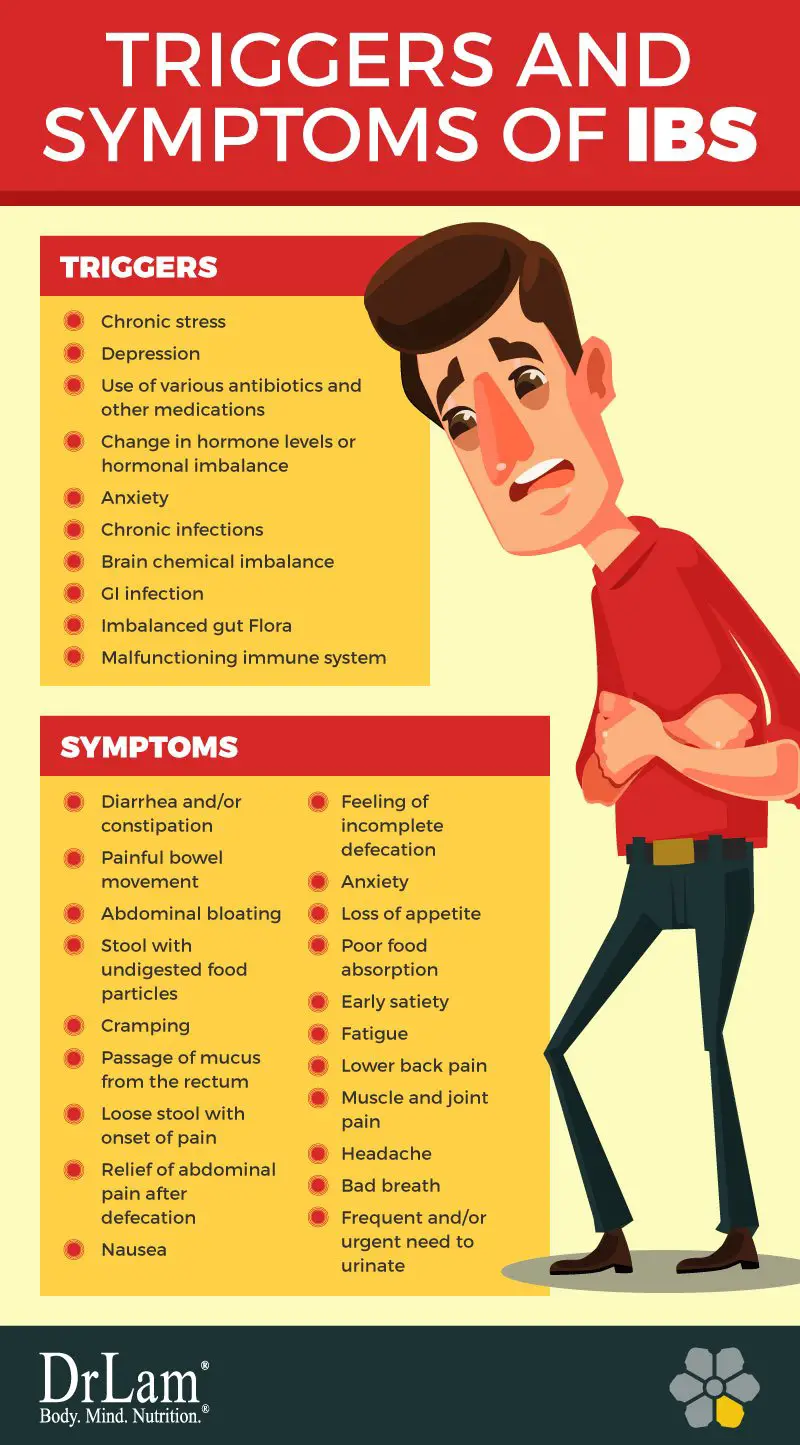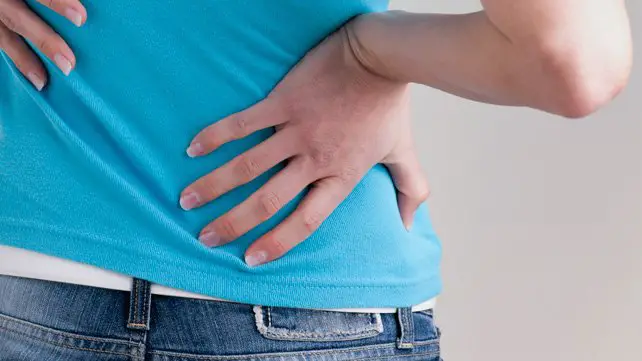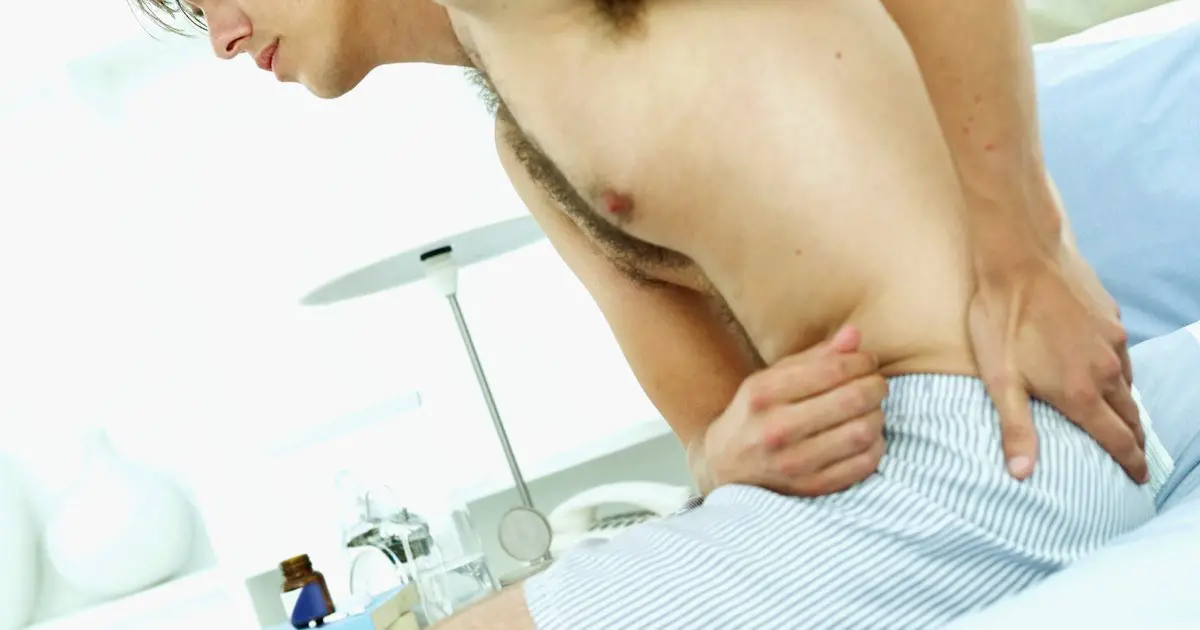How Is Ibs Diagnosed
If youve been having uncomfortable GI symptoms, see your healthcare provider. The first step in diagnosing IBS is a medical history and a physical exam. Your provider will ask you about your symptoms:
- Do you have pain related to bowel movements?
- Do you notice a change in how often you have a bowel movement?
- Has there been a change in how your poop looks?
- How often do you have symptoms?
- When did your symptoms start?
- What medicines do you take?
- Have you been sick or had a stressful event in your life recently?
Depending on your symptoms, you may need other tests to confirm a diagnosis. Blood tests, stool samples and X-rays can help rule out other diseases that mimic IBS.
Other Features Suggesting That The Pain Is Due To Your Ibs:
According to Rome IV criteria, the IBS Pain is:
- Associated with meals: usually, the IBS pain increases after meals. Especially known food triggers like FODMAPs and gas-producing foods.
- Associated with defecation: some IBS patients report relieve of IBS pain with defecation. Others report worsening of IBS pain during or after defecation.
- IBS pain frequency: the IBS pain is chronic, your first time experiencing IBS pain should be 6 months ago or more. The IBS pain occurs at least once per week.
- IBS pain character: IBS is described as cramps or colics. Usually associated with bloating and gas distension.
- Associated with changes in stool character: Yellow stool , Mucus in stool, and Hard stools .
What Is The Connection Between Ibs And Back Pain
Irritable bowel syndrome is associated with many uncomfortable symptoms, including back pain. IBS and back pain often are associated, though there are many possible cause-and-effect relationships. In some cases, back pain seems to be a direct result of IBS, but patients also might experience discomfort because of IBS management techniques, such as a change in diet. A common cause might set off both, or stress caused by the pain might even be responsible for a bout of IBS.
IBS and back pain often are observed together and, in many cases, the IBS is directly responsible for the pain. Abdominal pain during bouts of IBS is most common, but pain can radiate to other areas, including the back. Discomfort caused by the condition might cause a change in posture, which can strain the back. Pressure from bloating also might be a source of distress.
Patients who have IBS are likely to feel uncomfortable and might be inclined to move less and sleep more. With a lack of movement and exercise come a lack of fitness and the increased likelihood of back injury, which can further discourage movement and prolong the condition.
Recommended Reading: Mayo Clinic Lower Back Pain Exercises
Why Does Ibs Cause Back Pain
The connection between back pain and IBS is not fully understood but the discomfort is most likely the result of spasms in different parts of your large intestine, being referred through to your back.
Physical distension of the gut wall, more likely in the case of constipation, can also be a cause of pain, or it is possible that pain receptors in the gut may be overly sensitive and are responding unnecessarily to different food types or gut movements.
IBS isnt classed as an inflammatory condition. In the event that pain is a result of inflammation being present, inflammatory bowel disease rather than IBS may be responsible, in which case a trip to your doctor would be necessary. Please refer to our IBS or IBD page to find out more if you are in any doubt.
Please be aware that lower back pain may also indicate an issue with your kidneys so please be sure to seek medical advice if you experience this.
Can Ibs Cause Pain In Tailbone Right Above Butt

Ask U.S. doctors your own question and get educational, text answers â it’s anonymous and free!
Ask U.S. doctors your own question and get educational, text answers â it’s anonymous and free!
HealthTap doctors are based in the U.S., board certified, and available by text or video.
Read Also: Aleve Good For Back Pain
So How Are Ibs And Headaches Connected
While the exact reason is unknown, one theory is that it’s the result of the relationship between the gastrointestinal system and the central nervous systemâ also known as the gut-brain axis.
The vagus nerve, the longest cranial nerve in the body, connects the brain to the gut along the gut-brain axis. This nerve sends communications bi-directionally, meaning it can relay pain signals and information from the brain to the gut and vice versa. Because the vagus nerve is involved in both migraine pain and IBS symptoms, it’s often thought to be implicated in the overlapping symptoms.
Additionally, recent research into the migraine/IBS link has also identified two neuropeptides that may contribute to both migraine symptoms and gastrointestinal functions.
An upside to the gut-brain connection is that it works both ways. So, while it’s unfortunate that what happens in your gut can affect your head, there is evidence that what happens in your mind can also affect what in your gut. This is why treatments like hypnotherapy for IBS may effectively relieve IBS and headache symptoms without the need for drugs or diets. â
Ibs Headache And Migraine Pain
How can an irritable gut make your head irritable too? Head pain and gut pain may seem like an unlikely pair, but science shows that people with IBS also commonly experience migraines and headaches.
A study published in the Polish Journal of Neurology and Neurosurgery showed that between 23 to 53 percent of people with IBS experienced frequent headaches. Additional research, published in the Journal of BMC Gastroenterology, reported that people with IBS were around 60% percent more likely to experience migraines than people without IBS.
The connection between the gut and the head works both ways. Just as people with IBS often have headaches, people with migraines often experience gastrointestinal symptoms associated with IBS during a migraine attack.
Read Also: Is Aleve Or Ibuprofen Better For Back Pain
How Does Irritable Bowel Syndrome Cause Back Pain
Irritable bowel syndrome is a common disorder that affects the large colon. It causes cramping, abdominal pain, bloating, gas, diarrhea, and constipation. A hallmark feature of IBS is the relief of distressing symptoms upon defecation. Only a small portion with the condition have severe symptoms, and most IBS patients can control their symptoms by managing diet, lifestyle, and stress.
There is no clear reason why IBS can cause lower back pain, but it is assumed that irritation and disturbances in the colon create pain that presents itself in the back. Having bouts of constipation can lead to physical distention of the intestinal walls, possibly activating pain receptors of the lower back.
Irritable bowel syndrome should not be confused with inflammatory bowel disease , as there are no inflammatory processes occurring in IBS.
Nhs Explain The Best Ways To Treat Back Pain
We use your sign-up to provide content in ways you’ve consented to and to improve our understanding of you. This may include adverts from us and 3rd parties based on our understanding. You can unsubscribe at any time. More info
Back pain is something you need to see your GP about if it persists, gets worse, or if it stops you from doing day-to-day activities. Most of the time back pain isnt caused by anything serious, but it could be caused by a number of things.
Also Check: Aleve Or Advil For Back Pain
Symptoms Cluster In Ibs
A number of symptoms that occur together characterize irritable bowel syndrome . This may confuse you at first. Plus, symptoms will likely change over time. The changes may seem random. But there is a pattern to symptoms of IBS.
- The key sign or symptom of IBS is pain or discomfort in the abdomen. The abdomen is the area below your chest and above your hips.
- The other symptoms of IBS relate to your bowel habit. Youll notice a change in frequency or consistency of stool . These changes link to the pain.
- The symptoms occur over a long term and come and go over time.
- Some or all of IBS symptoms can occur at the same time. Some symptoms may be worse than others. Abdominal pain is often described as crampy, or as a generalized ache with periods of cramps. Sharp, dull, gas-like, or modest pains are common. The IBS discomfort or pain usually feels better after a bowel movement.
How Can I Best Take Care Of Myself If I Have Ibs
IBS will likely be with you for life. But it doesnt shorten your lifespan, and you wont need surgery to treat it. To feel your best, try to identify and avoid your triggers, including certain foods, medications and stressful situations. A dietitian can help you plan a nutritious diet around your specific needs. Talk to your healthcare provider if symptoms dont improve.
Also Check: Advil Vs Ibuprofen For Back Pain
What Is Ibs Treatment
No specific therapy works for everyone, but most people with IBS can find a treatment that works for them. Your healthcare provider will personalize your IBS treatment plan for your needs. Typical treatment options include dietary and lifestyle changes. A dietitian can help you create a diet that fits your life.
Many people find that with these changes, symptoms improve:
Dietary changes:
- Increase fiber in your diet eat more fruits, vegetables, grains and nuts.
- Add supplemental fiber to your diet, such as Metamucil® or Citrucel®.
- Drink plenty of water eight 8-ounce glasses per day.
- Avoid caffeine .
- Limit cheese and milk. Lactose intolerance is more common in people with IBS. Make sure to get calcium from other sources, such as broccoli, spinach, salmon or supplements.
- Try the low FODMAP diet, an eating plan that can help improve symptoms.
Activity changes:
- Try relaxation techniques.
- Eat smaller meals more often.
- Record the foods you eat so you can figure out which foods trigger IBS flare-ups. Common triggers are red peppers, green onions, red wine, wheat and cows milk.
Medical changes:
What happens if medications dont work?
In some cases, symptoms dont respond to medical treatment. Your provider may refer you for mental health therapies. Some patients find relief through:
Conditions That Cause Lower Back Pain And Constipation

It is also possible that you do not have IBS, but have constipation, which is also linked to lower back pain. Both constipation and lower back pain are fairly common medical issues, and are often nothing to be concerned about, but if they occur suddenly at the same time, it is advisable to see a doctor, as it might be a sign of a more serious issue. For example, the following are examples of conditions that cause both constipation and lower back pain to occur at the same time:
- Bowel obstruction
A bowel obstruction is a gastrointestinal condition in which digested material cannot pass normally or as it should through the bowel. A bowel obstruction can be caused by fibrous tissue that compresses the gut, which can develop many years after abdominal surgery. With a bowel obstruction, the blockage in your colon or rectum can create a dull pain that extends from the abdomen to the lower back.
- Endometriosis
Endometriosis is a condition in which the tissue that normally lines the uterus grows outside the uterus. In individuals with endometriosis, the tissues that should be lining the uterus can be found on the ovaries, fallopian tubes, or the intestines. Bowel symptoms are very common with endometriosis, as is back pain. This is because endometrial cells can stick to the lower back and the front of the pelvic cavities.
- Fibromyalgia
- Liver disorders
- Peritonitis
- Urinary tract infections
Don’t Miss: Advil For Back Pain Dosage
The Link Between Gluten And Back Pain
For most people, back pain does not evoke any thought of gluten intolerance. Clearly, most back pain is not attributable to gluten there are far more common reasons to experience it.* But the connection between back pain and gluten is worthy of discussion. Research has now emerged to show a link between gluten and some forms of back pain.
Many of my patients have celiac disease or gluten intolerance. Often, they recount back pain so severe it required MRIs, medication, and therapy. Some had mysterious pain that no one could explain. In many cases, the back pain resolved with a gluten-free diet. I often wonder how many of them made trips to their practitioner for back pain and were given various treatments that did not address the root cause.
When Should I See A Healthcare Provider
See your provider if you have symptoms more than three times a month for more than three months. And if you have symptoms less often, but they interfere with your life, its a good idea to talk to your provider.
Some symptoms may point to a more serious problem. Contact your provider as soon as possible if you have:
- Bleeding.
- Severe pain.
You May Like: Advil For Lower Back Pain
Tips To Prevent Or Decrease Bowel Problems
- Make sure you eat regularly: take at least three meals spread across the day and no more than three to four snacks in-between.
- Take time to eat and chew well.
- Ensure that your food contains sufficient fibre .
- Drink 1.5 to 2 litres of water per day.
- Go to the toilet on time, or even allocate a set time to go to the toilet undisturbed.
- Do not use laxatives without the permission of a doctor.
- Take sufficient and frequent exercise.
Why Would Celiac Patients Have Back Pain
Celiac disease is an autoimmune condition. Just as the new study suggests, there may be some autoimmune/inflammatory reactions involved in the creation of low back pain. Perhaps generalized inflammation is at the root of the symptoms. Whatever the mechanism, the studies cited earlier suggests inflammation is at work in the spine of a large majority of patients with celiac disease.
Recommended Reading: Is Motrin Good For Back Pain
What Does Ibs Back Pain Feel Like
In IBS, often the common symptoms such as bloating, or pain can be felt in a direct or localised way. This means with these types of symptoms of pains, it can be clear that theyre originating from the digestive system.
With IBS back pain, this can be often due to what is known as referred pain. How pain in one part of the body can lead to pain in another. For example, the is commonly seen in those with heart issues feeling a pain in their jaw.
In digestive issues such as IBS, this may be due to excess gas being produced and pushing on organs or nerves, resulting in symptoms of pain and discomfort.
Ibs Pain In The Chest
IBS is commonly associated with oesophageal diseases like Gastro-Esophageal Reflux Disease . This may cause Non-cardiac chest pain.
Unlike cardiac chest pain, chest pain due to IBS is not related to exercise.
But you should immediately consult your doctor if you have chest pain and you are:
- Male,
- Have a family history of cardiac disease.
- Your pain is related to exercise.
Recommended Reading: Aleve Or Ibuprofen For Back Pain
Best Pain Medications For Ibs
If youâre used to popping a pill to relieve IBS pain, then it may be time to rethink your treatment options.
Non-steroidal anti-inflammatory drugs , acetaminophen , and aspirin are often used to treat IBS pain because of their pain-relieving and anti-inflammatory qualities.
However, research published in the Journal of Anesthesiology and Pain Medicine suggests that the efficacy of these drugs in treating IBS pain is not well supported and long-term is associated with chronic constipationânot great if youâre already struggling with bowel troubles.
Additionally, NSAIDs appear to have negative effects on IBS patients, with research showing a link between frequent use of NSAID and the development of IBS symptoms.
If you still want to try an over-the-counter pain medication for IBS, then acetaminophen could be a better option, as itâs gentler on the stomach. Pain-relieving NSAIDs, like ibuprofen and naproxen, are known to cause gastrointestinal problems, ranging from mild to severe indigestion to the development of ulcers after long term use. â
When To See A Doctor

While back pain may or may not be a felt or referred pain matters very little when a person is in constant discomfort. However, there are other serious signs that you may be suffering from IBS. Those signs include:
- Severe bloating
- Looser and more frequent stools
- Irregular bowel habits
If you suffer from any of the above symptoms, then you should contact your doctor. There are a variety of treatment options for IBS, and you dont have to suffer through it on your own.
Recommended Reading: How Does A Diuretic Help Back Pain